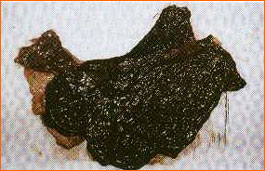Hydrocyanic acid is a solution of HCN in water, either 2 per cent or 4
per cent. Cyanides are extremely poisonous, their action depending upon
the inhibition of the respiratory enzyme cytochrome oxidase, which
prevents the uptake of oxygen by tissue cells.
Cyanides have a characteristic warning smell of bitter almonds, but up
to 80 per cent of the general population have a congenital inability to
detect this. Fruit kernels of almonds and cherries may have up to 0.1
per cent cyanide, and a death has been reported from drinking an old
bottle of almond liqueur.
Symptoms and death are often very rapid, but not necessarily so. Though
some literally drop dead within seconds, many linger for 15-20 minutes,
even after substantial doses, depending upon the speed of absorption.
The blood remains pink, due to failure of uptake of oxygen by the
tissue. The skin, after death, has a dark, purplish hue.
At autopsy, the smell of cyanide may be obvious; the organs will be
congested and dark red. If cyanide has been swallowed in any quantity,
the oesophagus and stomach lining will be black, due to erosion and
haemorrhage. Certain poisons, such as cyanide, are sometime present in
sufficient quantity in the stomach of the deceased to pose a risk to the
pathologist.
|
|
 The stomach lining in a case of suicidal cyanide poisoning. The mucosa is eroded and blackened by altered blood
The stomach lining in a case of suicidal cyanide poisoning. The mucosa is eroded and blackened by altered blood
|